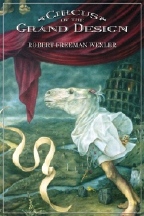 |
 Robert Freeman Wexler
Robert Freeman Wexler
Circus of the Grand Design
Reviewed by: Rick Kleffel © 2005
Prime Books
US First Edition hardcover
ISBN 1-894-81526-2
Publication Date: 08-30-2004
304 Pages; $35.00
Date Reviewed: 03-13-05
Index:
Fantasy
General Fiction
Horror
Circus novels have a special place in the history of speculative literature. From Charles G. Finney's 'The Circus of Dr. Lao' to Ray Bradbury's 'Something Wicked This Way Comes' to Edward R. Whittemore's 'Quin's Shanghai Circus', the big top has exercised an understandable attraction to writers of the weird and the macabre. With Robert Freeman Wexler's 'Circus of the Grand Design', readers can add another title to the list of must-read novels about traveling shows. Wexler wedges the reader slowly out of this world and into a subtly surreal dreamscape dotted with marvels great and small. He keeps the focus tight and the action low-key even as unreality overtakes the narrative. Wexler breaks down the barriers between performers and audience, readers and writers, dreams and reality with a disarmingly assured ease. He creates an erotic otherworld that's nonetheless grounded. Step into this tent and onto this train and expect a journey through a world at once symbolic and sensual.
Lewis is not getting on well with his girlfriend Martha, and he's embarked on the romantic seaside vacation he planned for the two of them alone. He's a publicist who doesn't particularly have his heart in his work. So when he accidentally burns the house he's rented down, he slinks away without telling anyone, and finds himself having breakfast with Dillon, the master and manager for the Circus of the Grand Design. Dillon offers Lewis a job as the show's publicist. Lewis accepts, steps on board the train and into a classic otherworld voyage.
One of the great pleasures of any circus novel is the cast of characters who comprise the show, and this novel is no exception. Wexler peoples his circus with a medium-sized cast of compelling and well-realized characters. From Bodyssia, the muscle-bound woman who wrangles trained capybara-bears to Floyd Perry, the jockey, Wexler deftly draws a group of traveling eccentrics who, though they certainly seem fit for the circus, still manage to seem sort of hardheaded and realistic. He ratchets back the twitches and tics of the show folk and in so doing he brings them more to life. Lewis balances perfectly the reader's willingness to succumb to the strangeness and the drive to figure out just exactly what is happening here. We know from the moment the capybara-bears get on the scene that something is subtly off about this show.
But like most circus novels, there's more than one thing happening at once. On one hand, the circus travels from the New York we know to places that take aspects of our world and combine them in an unfamiliar fashion, as if Atlanta, Georgia had been mashed into parts of Rome and London. On the other hand, readers are also acutely aware of the symbolic nature of this journey, as is Lewis. Wexler successfully creates a conflict between the two ways of seeing this novel, and it's this conflict that drives the narrative.
Wexler has a wonderfully matter-of-fact prose style that, combined with his understated sense of the surreal, enables him to create a world like our own but insulated from it. He creates scenes of surreal wonder and disturbingly off-kilter visions. He also imbues the novel with a rich sensual tone. The sensuous nature of the narrative is simultaneously erotic and frightening, as Lewis becomes ever more enveloped in a relationship with a purely symbolic creature. The force that should unite a man with the world instead cuts Lewis off, even from the netherworld into which he's been plunged. At two removes, one wonders if Lewis will ever be able to find his identity in this world again.
Wexler's plot moves at a languorous pace in the visible world. The train travels from one stop to the next, each increasingly strange and dislocating. Wexler's ability to evoke the unreal is unparalleled and extremely low-key. There is no large-scale reveal to be found here. In the symbolic realm, however, there's action aplenty, enough to keep readers riveted on the underpinnings of Wexler's creation. Those who would be inclined to do so could easily break out the Carl Jung and the Charles Fort and have a field day. Wexler's ride through our collective unconscious is a riot of iconic association and disassociation. It's like poking your fingers through the brains of a man watching a clown act with a mixture of regret, fascination and fear and pulling out the building-block visions. Yes, it's a more than a little frightening.
But fear mongering is not what this show is all about. Wexler's otherworld journey is about this world, about our fears and hopes and dreams and nightmares brought to life in a surreal and sensual narrative. Where other circus novel writers get garish, Wexler gets subtle. Where they get grandiose, he gets up close and uncomfortable. You won’t find greasepaint or blaring horns under this tent. What you will find is a carefully written, quiet and controlled journey deep into another, very human world, a world of the imagination. Wexler's got it all under control. Step right up. See the wonders -- in a mirror.
|
 |
